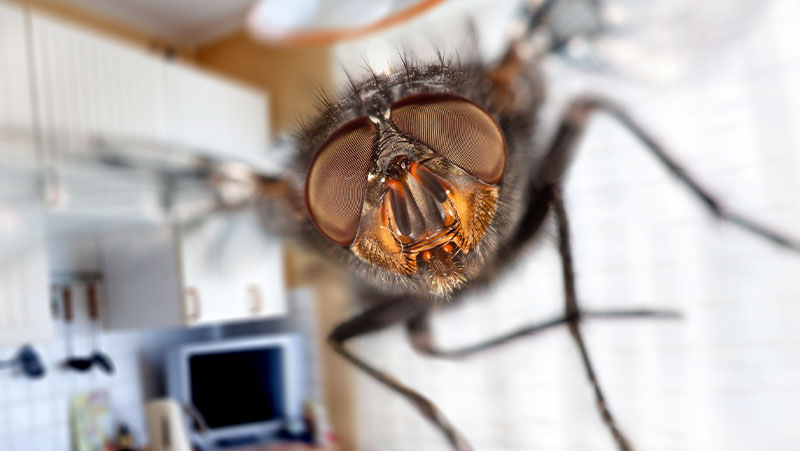The most effective way to keep flies away from your home or business.
Flies found inside a building enter from the outside in almost all cases. Therefore, barriers preventing access of flies to the building are the first line of defense. Cracks around windows and doors where flies may enter should be sealed. Well-fitted screens will also limit their access to buildings. Outdoors, regular removal (at least once a week) and disposal of organic waste, including dog feces and rotting fruit, reduces the attractiveness of the area to adult flies and limits their breeding sites. Garbage should not be allowed to accumulate and should be placed in sealed plastic bags and held in containers with tight-fitting lids. Garbage should also be placed as far from a building entrance as is practicable. In general, poor exclusion and lack of sanitation are the major contributors to fly problems.
What can I do to help control the flies?
- All food waste from the kitchen and other areas should be separated from other garbage, drained so it will be as dry as possible and then stored in sealed plastic bags before discarding. Place containers with small amounts of food waste, such as milk or yogurt cartons, into sealed plastic bags before disposal.
- Plastic bags used for waste disposal should be thick enough to avoid tearing or puncturing by insects such as yellow jackets.
- Promptly fix drains or electric garbage disposal units that leak or drains that allow food waste to accumulate under sinks or floors. Leaky drains can attract many species of flies. Remove any food waste that has accumulated under sinks or floors or in crawl spaces or basements at the site of the broken drain, and then clean the area thoroughly.
- Rinse all cans, bottles, and plastic containers before recycling or discarding.
- Garbage should not be left lying on the ground, this includes spills.
- If you have outside trash containers, place trash cans and dumpsters away from building entrances
- Wastes should be collected and moved off site at least once a week, because flies breed faster in warm weather.
- Make sure garbage can and dumpster lids seal tightly when closed and remain closed when not in use. Repair or replace garbage cans with holes or with lids that do not close tightly.
- Regularly clean garbage cans and dumpsters to prevent the build-up of food waste, an ideal place for flies to lay eggs. Use a high-pressure stream of water or a brush and soapy water, if necessary. A solution of borax and water will eliminate odors. Another option is to require the refuse company to replace it with a clean one more frequently.
- Flies can develop in soil soaked with water used to clean anything soiled, including garbage cans and dumpsters. Check these areas regularly. If you see maggots, scrape them up along with the soil and dispose of everything in a plastic bag sealed tightly.
- Cans should be lined with plastic bags that can be tightly sealed and removed daily.
- Remove animal droppings promptly and put them into plastic bags that are sealed before disposal.
- Eliminate the access point where flies are entering by sealing cracks, installing door sweeps, repairing door and window seals, etc.
- Clean up food and drink spills immediately.
- Store food items in sealed containers.
Pesticide options for fly control:
Pesticide treatment for flies is not a substitute for proper sanitation and aggressive elimination of nuisance fly development sites. Flies quickly develop resistance to insecticides and should be used #1 by a professional, #2 after all nonchemical strategies have been employed, and #3 only for immediate control of severe adult fly infestations. In the case of small flies, the only way to control the flies is to find and eliminate the source of the infestation. And once again, that is going to be a sanitation, exclusion, or repair issue to control the moisture.
Getting to know your flies.
Professionals are trained to identify fly species, and this is important as each fly species has a specific cause, distinct breeding site, life cycle, and in some cases a preferred food source.
Flies such as house flies, little house flies, dump flies, blow flies, and blue and green bottle flies which breed in food wastes (garbage) and/or animal feces are generally referred to as “filth flies.” Other flies such as stable flies breed in decaying vegetable matter such as grass cuttings. Small flies, such as Drain flies, fruit flies and fungus gnats that are often found in restaurants, home kitchens and bathrooms are not only a nuisance; they also present a health hazard because they can contaminate food, utensils, and surfaces. Biting flies, such as stable flies, can inflict painful bites.
Once you have done everything in your power to control the flies:
Call your professional Fly control expert. Invader Pest Management has specialized in professional fly management for nearly 30 years and can help relieve the nagging pressure of constant fly irritation in your home or business.
